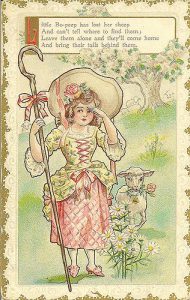
The Little Bo Peep song is one of those nursery rhymes that you will find has an interesting history. It could go back as far as Shakespeare, but we cannot be sure. There have been many accepted versions of these rhymes for kids, and this character is one that appears to have been around English literature for some time. Someone who has questions about how they will make the most of their rhyming time with the kids should look into the rhyme’s history first, the meaning of the lyrics, and why it is written that way.
#1: What Is It?
Little Bo Peep is all about the character who could not find her sheep. She has looked everywhere, and she does not know where they could be. The idea of the sheep not being with the flock is so common that it can be found in the earliest scriptures. Jesus uses this theme as a parable, and it is important to remember that rhymes for kids often come out of this tradition.
#2: Why Is It Changing?
The passing down of traditional rhymes orally means the lyrics likely won’t remain like the original. There are people who will change the lyrics to meet their needs. There are many ways to use these rhymes for kids in the middle of the song, and that is why you hear so many versions of it. There are many people who will change the words because they have heard it changed so many times, and there are many more who will use these rhymes to teach their kids the language. It does not matter what the words are at that point, and it is simply for the fun of it. The history of the rhyme means that Little Bo Peep and the appearance of the character has been altered many times over.
The character and history of Little Bo Peep is something that you should learn as you teach rhymes for kids. The kids want to know who this character is, and you can sing it with more confidence because you know who Little Bo Peep is. The history and the sheep alone are something to truly think about, and you must ensure that you have figured out how you will teach your kids to speak the language in the right way. They will use these rhymes to teach their kids, and they will keep the oral traditional alive that is very common among everyone in this part of the world.